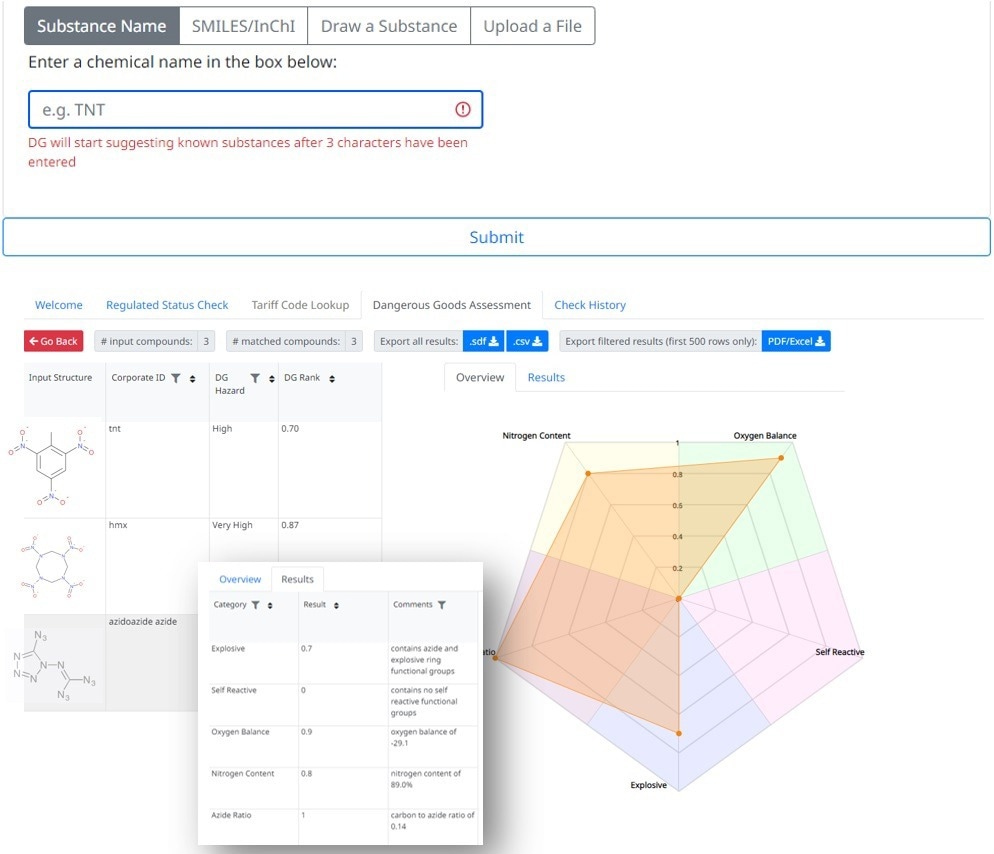Within pharmaceutical process development, chemicals previously synthesised at the milligram level require scaling up to gram levels and above.
These are often novel chemicals or utilise large numbers of intermediates and reagents, which may not have previously been fully assessed for explosion, self-reactive or energetic risks. This presents a significant safety hazard screening challenge and risk for labs, especially in early pharmaceutical development where only small amounts of material may be available, severely limiting or precluding physical testing.
DG Assessor is a predictive software tool that allows chemists and pharmaceutical process development groups a simple, powerful way to identify compounds of concern that may require further testing or alternative synthetic routes before scale-up, without using up precious sample.
Its potential use is not just limited to pharmaceutical process development. In 2020 an explosion occurred at Optima Chemical LLC in Belle, WV. The incident lead to one fatality and two injuries as well as a shelter-in-place for community members within a 2-mile radius of the facility and $33M in site damages. You can read more in this blog and also see how DG Assessor would have identified the chemical involved as being a very high explosion risk.
To asses a substance, simply enter a chemical name, upload or draw the chemical structure. DG Assessor will then assess whether this chemical is likely to be energetic, explosive, or self-reactive, taking into account high energy functional groups, self-reactive groups, oxygen balance, rule of 6 and other parameters of chemicals which have previously been shown to significantly improve hazard screening/identification. You can even optionally enter testing data, if available, such as a Differential Scanning Calorimetry (DSC) to further improve predictions.
This is ideal for process scale-up, situations where there may not be enough material for full-scale testing, or where there is a need to identify and prioritize high-risk chemicals.
Its evaluations also help DGSAs fulfill the requirements outlined by the 2019 UN Manual of Tests for the shipment of dangerous goods.
Using the UN guidance as a starting point and then enhancing and refining it in conjunction with major players in the Pharmaceutical and chemical industry, the DG Assessor allows for rapid assessments to improve process safety and help with GHS assessments, logistics, and dangerous goods assessments.
Key features
Check any chemical fast
A structure-based check that works with proprietary and novel chemicals. Users can also search via a chemical or common name.
Thousands of chemicals can be uploaded in a single check (.sd, smiles, and inchi). Alternatively, the clients' web services can be used to automate checks from ELNs, etc.
There is also the option to include data from Differential Scanning Calorimetry (DSC), Yoshida Correlations, and scale to help further refine predictions.
Powerful yet simple to use
Even if you are not a chemist or compliance expert, the system is super easy to understand. At the click of a button, users can access detailed technical information, as well as a full breakdown of what structural elements of the chemical leads to its explosive risk.
The danger levels for chemicals are divided into low, medium, high, and extremely high.
The device has been developed in collaboration with the DG and process chemistry divisions of a large pharmaceutical company. Its algorithms and checks also meet the requirements and assessments outlined in the United Nations Manual of Tests and Criteria for screening chemicals for potentially harmful substances prior to handling or export.
Availability
The system is available as a self-service pay-per-check, on an annual plan, or as part of an unlimited Enterprise plan.

Image Credit: Scitegrity
Upload, draw, or search for the chemical structure
Web services
Utilize RESTful, Knime, and Pipeline Pilot to automate checks.
Instant access
Web-based with nothing to install.
Support
For advice and assistance, the experts are always on hand to help.
UN compatible
Compatible with the 2019 UN Manual of Tests requirements for assessing chemicals for transport.
Availability options
Cloud-based

Image Credit: Scitegrity
Fully managed by Scitegrity, users do not need to install anything. They simply need to login, and then begin their checks. The package includes access to Scitegrity's web services / APIs.
Scitegrity's annual business plan offers heavily discounted rates for a larger number of checks for smaller companies.
For larger organizations, Scitegrity's Cloud enterprise plan includes dedicated servers, unlimited users, and checks and enterprise authentication.